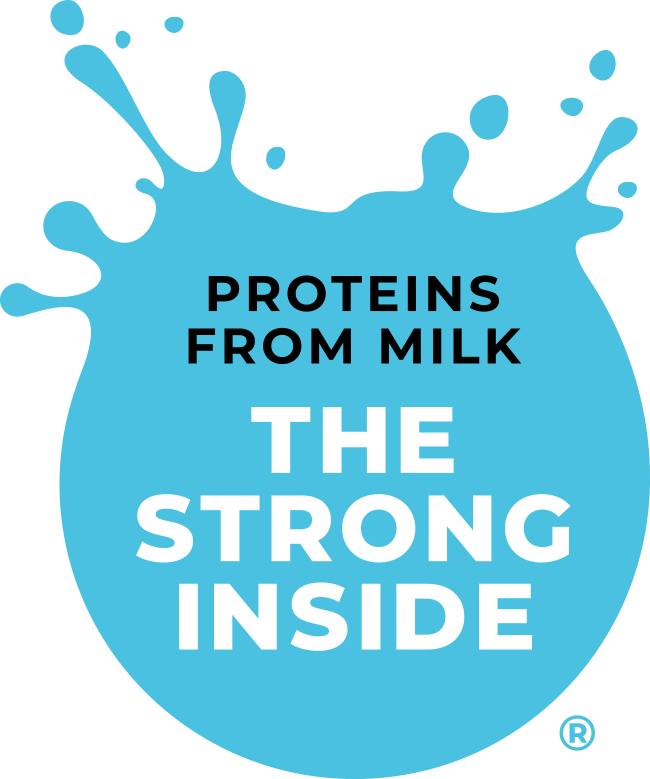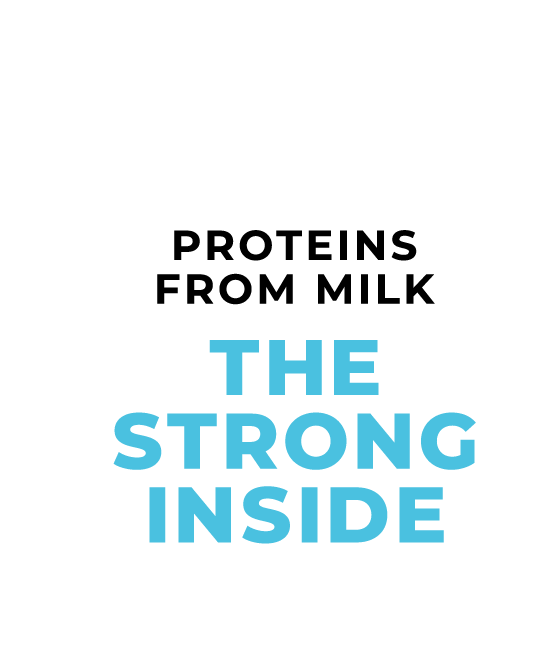Let us help you navigate the most frequently asked questions around complete proteins from milk, including the different types of proteins from milk, finding the best one for your health goals, and fitting them into your diet and lifestyle.
FAQ
What is protein?
Protein is an essential nutrient your body needs to take in every day to work properly. Protein is found throughout your body and is important because it provides energy and helps rebuild, maintain and repair body tissues, such as muscle and nervous tissue. Your body also uses protein to make new cells and to create specialized proteins, such as hemoglobin that helps carry oxygen to your body and support a healthy immune system.
Protein is made up of building blocks, called amino acids. There are 21 amino acids. The body makes 12 of them; they are called nonessential amino acids. The other nine amino acids must be consumed through food since your body cannot make on its own; these are called essential amino acids.1
1 National Dairy Council, USA. What is Protein? https://www.usdairy.com/news-articles/what-is-protein. Accessed April 17, 2020.
How do I find proteins from milk?
When shopping, just read ingredient lists. If whey, casein (caseinate) or milk protein concentrates and isolates are included, then your product contains proteins from milk. Proteins from milk are also found in a variety of products such as yogurt, cheese and, of course, fluid milk and milk beverages (from cows, not plants).
How are proteins from milk made?
What’s unique about how proteins from milk are made is the simplicity of the process – essentially just filtration and pressure. Unlike the process required to make most alternative proteins, extracting proteins from milk does not require the addition of artificial chemicals or harsh treatments.
How do proteins from milk compare to proteins from other sources?
Proteins from milk are high-quality, complete proteins. This means that they contain all nine essential amino acids in just the right amounts. But proteins are more than just the sum of the amino acids they contain. Proteins from milk contain bioactive peptides (short amino acid sequences) that are key to their benefits. These peptides have a positive, proven impact on body fat and lipid metabolism. 1
1 D’Souza K, et al. Whey Peptides Stimulate Differentiation and Lipid Metabolism in Adipocytes and Ameliorate Lipotoxicity-Induced Insulin Resistance in Muscle Cells. Nutrients, 2020, 12:245.
Where do I find proteins from milk?
You can find proteins from milk in yogurt, whey powders and cheese. And, make sure you look for whey, casein (caseinate) or milk protein concentrates and isolates on the ingredient labels of bars, beverages and other ready-to-eat products.
What are different types of proteins?
There are several kinds of proteins from milk used as ingredients or supplements. Whey protein concentrate (WPC); whey protein isolate (WPI); hydrolyzed whey protein or hydrolyzates; “native” whey or milk whey; caseins and caseinates; micellar casein; milk protein concentrates; and milk protein isolates. Read more about these proteins here.
Slow vs. Fast: There also are “slow” and “fast” proteins, categorized by how fast they are digested. Whey proteins are fast proteins, while casein proteins are slow proteins. They are both excellent quality, but they are used by your body at different rates.1 Both whey and casein are beneficial, it just depends on how fast you want to digest them.
Protein is a valuable multitasker and does many important things in your body. Getting enough protein can help with1:
- Building lean muscle
- Keeping you fuller, for longer
- Energy and focus
- Maintaining bone health
- Maintaining a healthy weight and keeping excess weight off
In fact, protein is part of every cell in your body.2 That’s why protein is a nutrient many people want to get more of every day and often make it a priority to meet their daily protein requirements.
1 Frühbeck, G. Protein Metabolism. Slow and Fast Dietary Proteins. Nature. 1998 Feb 26;391(6670):843, 845.
2 Milk Life. High Protein Morning. https://milklife.com/high-protein-morning. Accessed April 17, 2020.
What products contain proteins from milk?
Proteins from milk come in many forms. Whey (concentrates and isolates), caseins and milk protein concentrates and isolates. At home, you can mix protein from milk powders into countless recipes to help you reach your protein goals.
What is the best protein for controlling hunger?
All proteins from milk will help you feel fuller longer. Even a small amount of whey protein, as low as 15g for example, can increase satiety.

